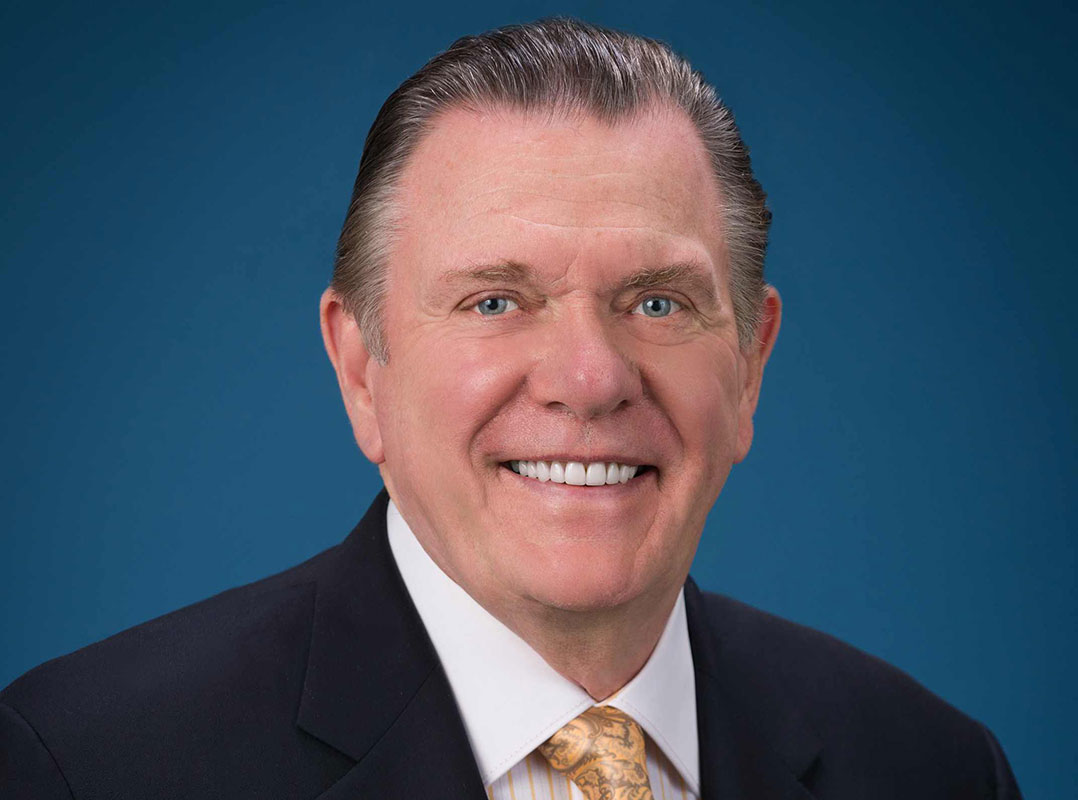
In The Gamble, his 2009 book on the Iraq War, Pulitzer Prize-winning journalist Thomas Ricks described Jack Keane, a retired four-star general, as “crackerjack smart and extremely articulate, often in a blunt way. Most importantly … he is an independent and clear thinker.”
Keane began his military career at Fordham as a cadet in the University’s ROTC program. He graduated in 1966 with a bachelor’s degree in accounting and went on to serve as a platoon leader and company commander during the Vietnam War, where he was decorated for valor. A career paratrooper, he rose to command the 101st Airborne Division and the 18th Airborne Corps before he was named vice chief of staff of the Army in 1999.
Since retiring from the military in 2003, Keane has been an influential adviser, often testifying before Congress on matters of foreign policy and national security. In late 2006 and in 2007, he was a key architect of the surge strategy that changed the way the U.S. fought the war in Iraq. He is a trustee fellow at Fordham; a member of the board of directors of General Dynamics, an aerospace and defense company; and chairman of the board of the Institute for the Study of War, a Washington, D.C.-based think tank that monitors global conflicts. He’s also a senior national security analyst on Fox News.
Keane spoke with FORDHAM magazine about service, leadership, and whether or not his loyalties will be divided on Sept. 1, when Fordham football opens its 2017 season with a game against Army at West Point.
What inspired you to join the Army?
I joined the ROTC program essentially because the country was at war and we knew that we would likely be joining it. In the mind of myself and my friends, it made sense to do that as officers, although none of us had ever had a family member who was an officer. Then, as part of the ROTC program, I joined the Pershing Rifles [national military society] because they seemed more confident and accomplished than the other participants in ROTC.
We took basic marksmanship training, and we would go to Camp Smith and practice patrolling techniques and other tactics under the supervision of active-duty officers. That gave me some exposure to what I thought the Army would be like. By the time I graduated, I came to recognize that I had an aptitude for it. And I liked the idea of serving the country.
I saw an interview you did a few years ago with Bill Kristol. You told him about a conversation you had with a Jesuit around the time you were graduating from Fordham. Who was that Jesuit and what did you two talk about?
I think it was Father [Thomas] Doyle, [then an assistant professor of philosophy], but I’m not sure. He asked me what I was planning to do, and I said, “I’m going to go in the Army.” He said, “No, I mean, after the Army.” I said, “Well, I’m thinking about maybe making a career out of it if I’m capable and if I like it to the degree that I think I will.” He said, “Why would you do that? You have so much more to offer.”
I said, “Well, Father, have you ever been associated with the Army? Were you a chaplain?” He said no. I said, “Well, I’ve spent a lot of time around it and people who serve in it, and I don’t think it’s necessarily what you think it is. I think there’s an incredible amount of opportunity for growth and development as a human being. I think I’ll have the freedom of thought and the opportunity to be very challenged, and I think that will lead to a growth experience for me.”
That turned out to be the case.
The way you describe the Army, in terms of opportunities for growth within a strict organizational structure, could also be applied to the Jesuits, I would think. You went to Catholic schools before Fordham, but was Fordham your first encounter with the Jesuits?
I told my new Army friends that after 16 years of Catholic education, the transition to the Army was very smooth! I think of Fordham and the Jesuits as a transformational experience. The rigor of the Jesuit methodology was evident in all classes. What they were least interested in is regurgitation of information. What they’re most interested in is critical thinking based on analysis and some rigorous method of interpretation using reasoning.
That was challenging because it was completely different than my Catholic high school. I thought college was just going to be high school on steroids. At Fordham, it was quite something else. The whole learning process was about your own growth and development as a human being—not just intellectually but also morally and emotionally. I don’t think I would have been as successful as a military officer if my path didn’t go through Fordham University.
Would you talk about your approach to leadership and how it has evolved since your days as a platoon leader? Are there certain qualities that you feel all effective leaders share?
First of all, there are very few natural-born gifted leaders. Most leaders learn from experience. If you’re in the United States military and you start out as a second lieutenant platoon leader with 40 people, your life from that moment on is a leadership laboratory. You have plenty of opportunity to learn and also to observe leaders who are very effective.
When you really get down to it, what you’re doing is motivating and inspiring others to reach their full potential and to do that collectively as an organization. Whether it’s a small team or a large team, the opportunity to learn and to grow is really quite extraordinary.
Some of that for me was in combat, which is such an extraordinary human experience. Everything that you are as a person—your character, your intellect, your moral and physical courage—is brought to bear under significant stress. People’s lives are dependent on you. You’re not only there to protect the civilian population and protect your own soldiers; you’ve been given the authority to take lives. The moral underpinning for something like that is really quite significant. I think having had 16 years of Catholic education and participating at Fordham, where I took four years of theology and four years of philosophy, which were my favorite courses, by the way, really provided me with the wherewithal not only to cope with combat but to perform to a high standard.
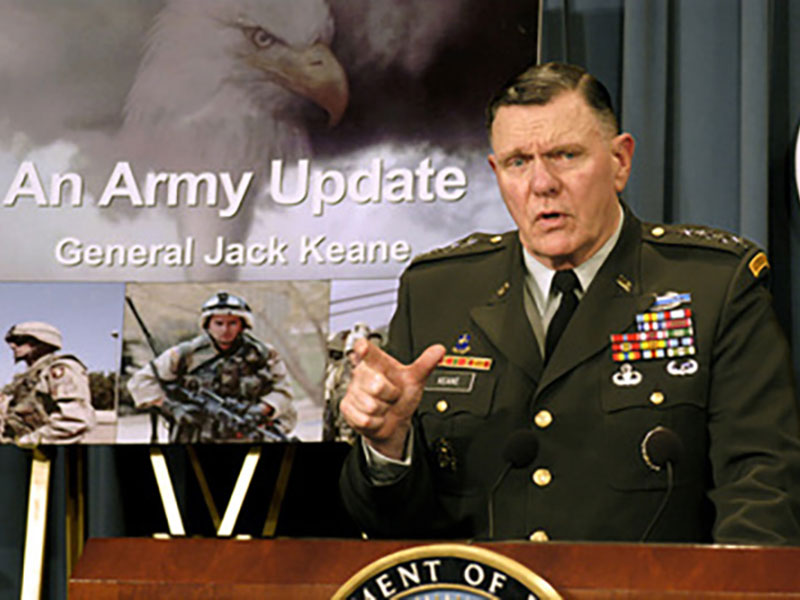
With regard to leadership, anybody can make a list of attributes leaders have to have—integrity, judgment, moral underpinning, et cetera. But there is one attribute that’s always stood out for me, and that’s perseverance. You have to persevere to accomplish the mission. Whether that’s in a stressful situation like combat or in other environments, perseverance really can be very defining because there are constant impediments and obstacles. You see people, not just in the military but in all walks of life, who because of those obstacles and impediments accept something less. They could continue to drive on. Most of the time, it’s more about mental toughness than it is about physical toughness.
Two years ago, Fordham ROTC established the General Jack Keane Outstanding Leader Award, to be given each year to a graduating cadet. What does that award mean to you, and what advice do you give newly commissioned officers?
I was honored to give out the first General Jack Keane Award [at the University Church in 2015]. And I was quite humbled by it, to be frank, when I got my head around the fact that they will always give this award to somebody who is outstanding as a cadet and likely more outstanding than I was.
I’ve always told my officers and my generals that we’re in leadership positions because we know how to lead effective organizations; we get results. But our legacy is not how well we run these organizations, because there’s another guy or gal standing behind us who could run it even better. The real legacy is the growth and development of the people in these organizations. If you focus on their growth and development, and if you have programs that support that, the organization will take care of itself. The organization will actually blossom because the people in it are so committed to it and have a very high degree of satisfaction. That is your legacy.

What’s the best piece of advice you’ve ever received?
It came from a sergeant major. I was a major at the time. I was very intense, working very hard, and I was a little frustrated with my boss, my battalion commander, who wasn’t paying attention to all the things I thought he should be paying attention to. The sergeant major closed my office door and said to me, “Major, I know you’ve got some things that are bothering you. I want you to know just one thing: You’re responsible for your own morale.” He looked at me and said, “You got it, sir?” I said, “I got it, sergeant major, thank you very much.”
I never forgot that. It was sound advice.
Fordham football is playing Army at West Point on September first. Who will you be rooting for?
I’m going to miss the game, unfortunately, but good Lord, I want to beat those guys. When I go to West Point for the game, I usually talk to the corps of cadets about the U.S. global security challenges: the Middle East, Russia, the problems with Al Qaeda and ISIS, et cetera. After I spoke a couple of years ago, the first question I got was from a cadet. He said, “General, so we understand you went to Fordham University. You spent almost 40 years in the Army, and you spent only four years at Fordham, so I’m assuming you’re rooting for Army.”
He was just having fun with me, but I looked at him. I said, “Are you kidding me? You know damn well who I’m rooting for tomorrow, OK? I’m rooting for my alma mater.”
So yes, I want both teams to play well, certainly, but I definitely want us to win.
Interview conducted, edited, and condensed by Ryan Stellabotte.
]]>That was one of the major themes of the General Counsel Cyber Summit, a daylong conference jointly organized by Fordham, the U.S. Department of Justice, and the FBI.
The Feb. 18 gathering at the Lincoln Center campus brought together representatives from private industry, academia, government, and law enforcement for lectures, breakout sessions and panels.
In the keynote address, Russell Fitzgibbons, chief risk officer at The Clearing House, implored participants to consider the wide-reaching implications of actively sharing information both within the financial industry and with government partners.
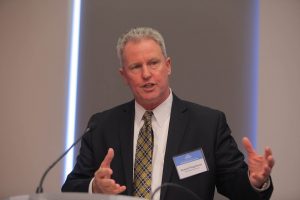
He said what finally convinced disparate players in the industry to work together was the DDoS (Distributed Denial of Service) attacks of 2012 and 2013 on several large banks and other financial institutions, including Bank of America, JPMorgan Chase, Wells Fargo, and the New York Stock Exchange. He said he’d attended meetings with banking security officials who had not met together previously on the matter of cyberattacks.
“They were sharing information then and there . . . information about what they were experiencing, when they experienced [it], how long it lasted for, what the effects were and so forth, and they shared that with their colleagues so that they could better prepare themselves when their turn to be attacked [arrived],” he said.
He praised the Information Sharing and Analysis Centers (ISACs) for bringing together private enterprise and government officials. A common perception that agencies such as the Treasury Department, Secret Service, and the Department of Homeland Security are loath to share information is accurate to a degree, but is improving, he said.
“A lot of work has gone into getting access to classified information but more importantly, getting it unclassified—making [it]available,” he said. “People who who had complained about this issue have said, ‘we are seeing the difference. We are seeing information we hadn’t seen before, and just as importantly, we’re seeing context around this information.”
Fordham’s General Counsel Elaine Crosson moderated a panel on legal issues, featuring Sean Farrell, unit chief, Cyber Law Unit, Office of General Counsel, FBI; Sean Newell, deputy chief, Cyber, Department of Justice; and Leonard Bailey, special counsel for national security, Department of Justice.
When a business suffers a cyber intrusion, said Bailey, asking for assistance from the authorities can often cost the business more money than not involving them. The new Cybersecurity Information Sharing Act (CISA), passed last year by Congress, attempts to make it more financially prudent to share sensitive information.
“It attempts to address the security needs of business and the government [and]also address the privacy concerns that people have,” he said. It is also “an attempt to incentivize disclosure, so it contains a provision for liability protection for the act of disclosing information, which should be helpful with regard to many of the privacy statutes that [general counsels]face.”
]]>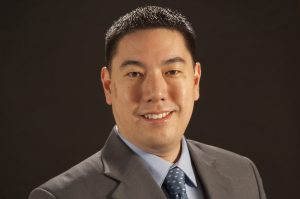
Raymond Kuo, PhD, an assistant professor of political science who joined Fordham in September, focuses his scholarship on international relations, with a focus on security and grand strategy. Before working in academia, Kuo worked for the National Democratic Institute as a program officer overseeing political party development projects in the Middle East, South and Southeast Asia, and Africa. He also worked for the United Nations and the Democratic Progressive Party of Taiwan as a foreign policy analyst and organizational strategist.
We asked Kuo to share his thoughts on what The Intercept‘s findings mean for the U.S. drone program.
Fordham News: The first drone was used by the U.S. military in 2000. Why hasn’t the targeting technology improved much?
Kuo: The technology has definitely improved since 2000. In addition to arming the MQ-1 Predator (the drone we commonly associate with these strikes) with Hellfire missiles, the U.S. has upgraded its sensor and targeting platforms. But the U.S. military has stopped acquiring Predators and is focusing more on the MQ-9 Reaper, its bigger, badder cousin. It is significantly faster and larger, able to carry a larger payload, and has a substantially longer operational range and loiter time (i.e. the time it can monitor an area before it has to refuel).
However, we could think that unintended civilian deaths or “collateral damage” are a sign that the program needs improvement. But the issue is not technology, but targeting: Are we hitting the right people and avoiding killing innocent bystanders? And that requires good intelligence. The MQ-9 and other strike vehicles have impressive signals intelligence collection capabilities. However, human intelligence is just as, if not more, important in effective targeting.
But developing human intelligence is not easy nor cheap. The U.S. would either need boots on the ground or rely upon local governments and informants to provide us the targeting information, which they may not have or may not be equipped to acquire.
You should always evaluate policy in comparison to other alternatives, never in isolation. Are we as Americans willing to pay the cost of a more accurate, but costly and assertive strategy? If not, are we willing to walk away and let terrorist networks potentially grow in power and membership? If we decide that the drone program is the best way to balance these costs and benefits, then we need a clear understanding of its actual effects, as I’ll address in the next question.
FN: Aside from more accurate intelligence, and stealth technology, despite the Intercept’s report, and the ongoing protests against the usage of drones, will the U.S. stop using them?
Kuo: The short answer is no. The U.S. will continue to use drones in battlefields or countries where it has already established air superiority (either militarily or through agreement with a host government) and does NOT want to commit troops in a direct combat role.
But the deeper answer is no, the U.S. will continue the program because it seems to work. Both the Pakistani Defense Ministry and the U.S. Army War College claim that a relatively small number of civilians have been killed by the strikes. Somewhere around 3-4 percent of those killed are civilians. Now, the Intercept is correct that America’s targeting rules are far too loose. The “signature strike” policy – where we target people simply because they are male and seem to be of a certain age group – is counterproductive and ultimately harmful to our interests.
Moreover, overall the program seems fairly successful, at least in Pakistan. C. Christine Fair of Georgetown University has described how locals in that country’s tribal areas come outside when they hear drones overhead. They consider the drones to be accurate and generally targeting foreign fighters, allowing them to reassert control over their villages and get on with their lives.
So the policy is widely popular in the Pakistani districts in which it operates. Christopher Swift makes a similar finding in Yemen, and I would hope that other operations in the Horn of Africa and the Arabian Peninsula are also successful. However, the program has created enormous public backlash within the wider Pakistani public. This is a significant strategic headache for the U.S., but one which I think can be partially addressed, as I’ll discuss later.
FN: If we schedule a drone strike and it doesn’t achieve its goal, and/or kills innocent civilians, it’s not surprising if it inspires new recruits for ISIS and the like. Why doesn’t that change our tactic? Are ‘boots on the ground’ just that much less well received by the American public? [Ed. It was announced on Oct. 30 that the U.S. will be sending special ops troops to Syria.]
Kuo: Any civilian deaths in war are tragic, particularly among the wounded and children. But it’s also important to note that civilian casualties are completely allowed under the laws of war. They cannot be intentional or directly targeted, however. So if the deaths are truly accidental, the result of bad intelligence, poor targeting, or some other factor, it’s a horrible situation but they are still legally and even morally allowed. Military necessity – the desire to bring a conflict to a close sooner and potentially save even more lives – unfortunately means that civilians can be caught in the crossfire. Effective militaries want to minimize that as much as possible, but recognize that innocent deaths may occur in the course of their duties.
But you ask a deeper question about the strategic effects of strikes. Do they cause more harm than good? Preliminary results from my research suggest that strikes actually stabilize the areas in which they fall, so long as we kill the right people. The opponents of the program are correct if we only concern ourselves with “regular” militants. For each one the U.S. has killed in Pakistan, 47 civilians leave their districts, suggesting that they are moving for safer or better prospects elsewhere. However, killing a militant leader acts as an enormous brake on this outward migration. Over 1,100 people stay in their districts for each leader killed. And finally, killing a civilian means that 98 people want to stay. That is, the public seems willing to absorb a certain degree of innocent deaths so that the program can achieve its objectives.
Again, these are preliminary results, and I’m still subjecting the data to more tests. But I should note that the region of Pakistan where the numbers are drawn from is an active conflict area. The U.S. doesn’t have a military presence there, and it’s difficult for journalists to make their reports. So the numbers that organizations like the Bureau of Investigative Journalism (one of the sources the Intercept report relied upon) receives come from the people on the ground. In other words, the militants themselves. So even using their numbers, we’re still seeing evidence suggesting the drone program is having a positive effect overall.
FN: Is it possible that our drone strategy would change if a Republican president were to take office in 2016?
Kuo: Drones have been used under both the George W. Bush and Barack Obama administrations. I actually don’t think the party in office matters too much to the drone program per se. The operations are in place because they are a relatively cheap option which seem to achieve some of their goals while preventing American casualties. If a more aggressive or militaristic president or Congress emerges, I suspect they’ll commit actual troops to these battlefields, rather than rely upon drones as the primary intelligence, surveillance, reconnaissance, and strike vehicles.
But as I mentioned earlier, the program does have a substantial political drawback: It engenders extreme dislike in the wider public. But we should keep in mind that drones – for all the terror and awe they may induce – are actually pretty weak combat platforms. The Predator was originally designed as a surveillance and reconnaissance platform. Drones in general are relatively slow and unmaneuverable, which you want since they will be loitering over an area. But even a minimally competent air force or air defense network could swat them out of the sky. Drones can only operate where the U.S. has air superiority, typically by reaching an agreement with the host government.
And it is those individuals who need to take more responsibility for the program. In Pakistan and Yemen at least, the U.S. operates with the consent and even active (though hidden) support of the government. As an illustration, consider that in 2008, Pakistani Prime Minister Yousaf Raza Gilani reportedly stated “I don’t care if they (the Americans) do it (the drone program) as long as they get the right people. We’ll protest in the National Assembly and then ignore it.” There are even suggestions that the program has been manipulated by these groups to selectively strike at political enemies, rather than target all insurgents.
So host governments have been playing both sides: protesting against the strikes, even urging their people to do so, while secretly pushing for more drone operations. That is pure political cowardice, but it also makes political sense given the incentives these politicians face. So if (and that’s a big if) this is an important enough issue, the U.S. needs to push these individuals to be open about their decisions to deal with the general public backlash against strikes.
Learn more about, and contact, Kuo on his website.
]]>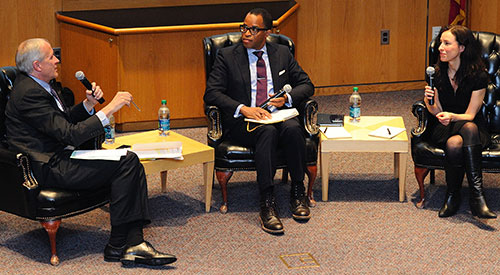
On a day surprisingly full of news about Edward Snowden, Fordham Law’s Center on National Security and PEN American Center added to the conversation on Jan. 23 by hosting a debate on the fugitive’s future.
The panel pitted competing views of The New Yorker journalist Amy Davidson against those of Jonathan Capehart of The Washington Post. David McCraw, assistant general counsel for The New York Times, moderated the discussion.
The debate took place within hours of Snowden’s live Q&A on the website www.freesnowden.is, in which he directly addressed the question “Under what conditions would you agree to return to the U.S.?” His answer: “The 100-year old law under which I have been charged . . . was never intended to be used against people working in the public interest, and forbids a public interest defense. This is especially frustrating, because it means there’s no chance to have a fair trial—and no way I can come home and make my case to a jury.”
Conditions for Snowden’s return to the United States emerged as the primary focus of the evening’s discussion. Coincidentally, earlier in the day politicians from both parties began to seriously consider negotiations, which some said should include clemency.
U.S. Attorney General Eric H. Holder Jr. said Snowden must plead guilty before any such negotiations could begin.
“We wouldn’t be talking about clemency if he hadn’t committed a crime,” said Davidson, who noted that “pardon, clemency, and plea bargaining are not terms that we have to invent for this case.”
But she also said “if we think there’s benefit [to]interrogating him, then Moscow is not the best place to have him.”
Capehart concurred that Snowden should return, but he was not warm to the idea of clemency, frequently repeating that the former government contractor must be held accountable. He said he had a hard time believing that there were not other channels available for Snowden to take the sensitive information—rather than the press. He specifically suggested members of Congress.
As it stands now, Capehart said, the federal government doesn’t know what other information Snowden is in possession of, even though Snowden claims he has no other files.
“Shouldn’t we be concerned about what happened when he was in Hong Kong and in the airport in Russia? And what those respective government officials did?” he asked.
Davidson argued that going to a government official or congressman likely would have prevented a national conversation on the National Security Administration’s [NSA] overreach and illegal eavesdropping.
“If he’d immediately turned himself in, we wouldn’t have heard a word he said about [his]motives,” she said.
Panelists agreed that the 35-year prison sentence given to Chelsea Manning, the former Army private who released the largest set of government documents ever leaked, hovers over the Snowden affair. Davidson said that giving “slightly random young people” security access is just one of the many aspects of the case that suggests mismanagement on the part of the Congress.
“Congress failed and was failed [by the NSA]in terms of disclosure and oversight,” said Davidson.
Panelists also noted that President Obama himself had acknowledged in The New Yorker that “legitimate policy questions” have been raised by the Snowden leaks. But the president questioned whether “giving some 29-year-old free reign to dump a mountain of information” was the best way to start the conversation.
Davidson said the security breach reveals more than just policy concerns.
“[True], the NSA has compromised the Constitution, but more importantly they’ve been clumsy,” she said. “And that’s good to know.”
View a video of the panel discussion here.
]]> Glenn Greenwald, the journalist who Edward Snowden turned to when he leaked documents about the National Security Agency’s top-secret surveillance programs, will join a panel of experts on Thursday, Nov. 14 for a discussion at Fordham Law School titled “They’re Watching Us: So What?”
Glenn Greenwald, the journalist who Edward Snowden turned to when he leaked documents about the National Security Agency’s top-secret surveillance programs, will join a panel of experts on Thursday, Nov. 14 for a discussion at Fordham Law School titled “They’re Watching Us: So What?”
For the discussion, which will be held from 7-8:30 p.m. at the McNally Amphitheatre, the Center on National Security has also lined up:
-James Bamford, author of The Shadow Factory: The NSA from 9/11 to the Eavesdropping on America (Anchor, 2009);
Chief among the issues they will be tasked with addressing is what we know—and don’t yet know—about how surveillance is reshaping our public and private lives.
The panel will be moderated by Suzanne Nossel, Executive Director of PEN American Center, and will also try to answer questions such as:
What effect is the expansive American surveillance state having on us?
Are the programs that Snowden revealed inhibiting the way we think, speak, and create, distorting social interactions, damaging individuals or communities?
The discussion will be live-streamed at http://www.pen.org/event/2013/10/25/theyre-watching-us-so-what
For more information and to RSVP, visit http://centeronnationalsecurity.org/node/835, or e-mail [email protected]
—Patrick Verel
The conference keynote address, “A ‘Drone Court’: The Pros and Cons” will be delivered by Jeh Johnson, former general counsel for the Department of Defense.
Panels will bring together political and military leaders, national security and cyber experts, leading journalists, and others to provide a platform for understanding the next phase of America’s international ‘war on terror’ and, in a larger sense, the future of warfare.
They will address:
-Targeted Killing: Ethical, Political and Foreign Policy Implications
-The Laws Governing Targeted Killing and Non-traditional Warfare
-A Conversation on Cyber
-Understanding Today’s Wars
“21st Century Warfare: Law, the Enemy, and the Battlefield”
Monday, March 18
9 a.m. – 5 p.m.
McNally Amphitheatre, Fordham School of Law, Lincoln Center campus
To RSVP, email [email protected], or visit www.CenterOnNationalSecurity.org/RSVP
]]>